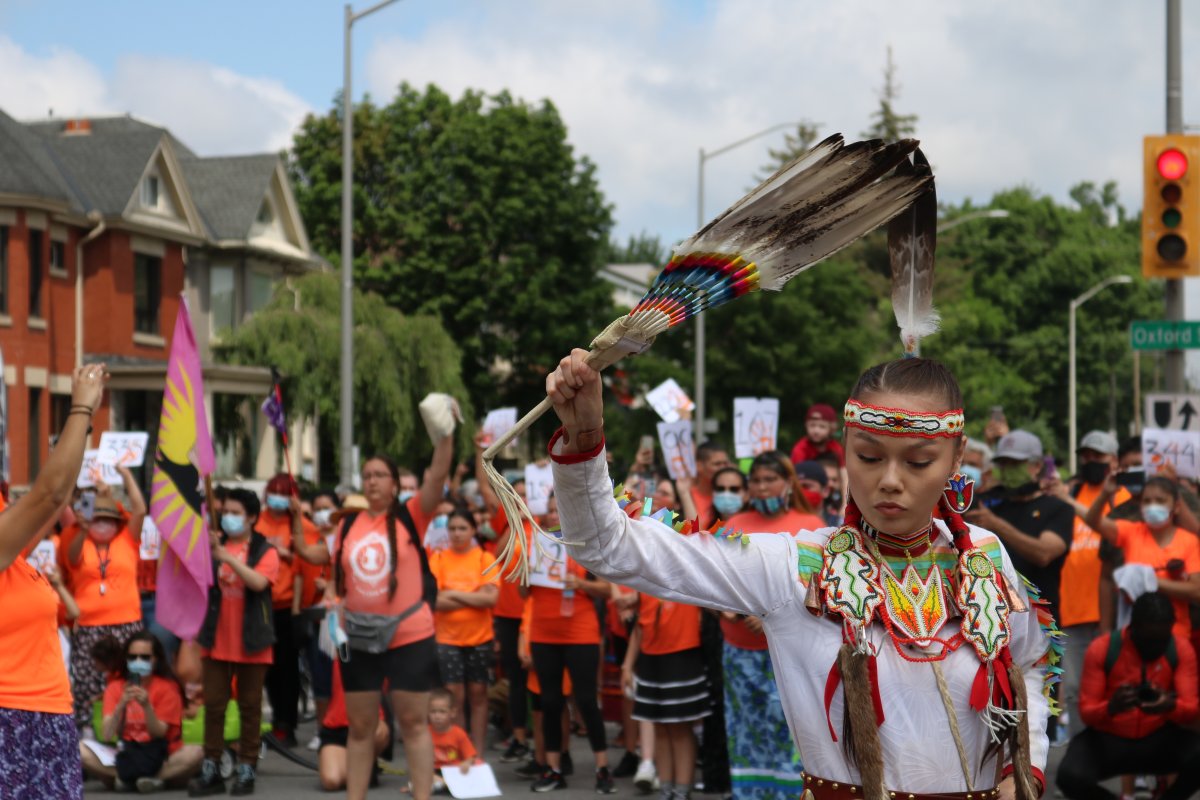Thousands of people are expected to descend on London, Ont.’s, downtown core Friday morning for the second annual Turtle Island Healing Walk to honour the survivors of Canada’s residential school system and the thousands of Indigenous children who never made it home.

“This day is a day to honour. This walk is a walk to heal. And our future is a future of hope. We may not know their names but together we lift them up. On July 1st, we walk for them,” a post on the walk’s Facebook page states.
Participants will begin gathering in Victoria Park for a ceremony at 9:15 a.m., with the walk itself set to begin about an hour later, said the walk’s director, Elyssa Rose, spirit name Little Thunder Woman.
“We will start about 9:15 in the morning with opening prayer. We will have a welcoming at around 9:30, and then we will have grand chiefs, some chiefs of the area as well as youth councils and our jingle dress dancers sharing the stage and some words,” said Rose, who also serves as anti-human trafficking coordinator at Atlohsa Family Healing Services.
Those gathered will then begin the walk around 10:15 a.m., moving north down Richmond Street with a silent memorial to honour those who never made it home, Rose said.
“At Richmond and Oxford, we will have our jingle dress dancers take over, our hand drummers leading that, and then we will have the release of orange smoke again this year, which will represent the honour sending those home and acknowledging survivors in our community,” Rose said.
- ‘Alarming trend’ of more international students claiming asylum: minister
- Justin Trudeau headed to UN Summit of the Future amid international instability
- Canadian government’s satellite deal has Tories calling for Elon Musk involvement
- Activists call for Boogie the monkey to be removed from Ontario roadside zoo
The walk will then proceed east down Oxford Street, south down Colborne Street, and then west onto Dufferin Avenue. The route is shorter than the five-kilometre route the walk took in 2021, a change Rose says was made to be more accommodating to elders and those with disabilities.

Get breaking National news
The first Turtle Island Healing Walk was held last summer in response to the discovery of hundreds of unmarked graves at a former residential school in Kamloops, B.C., and further discoveries at former residential schools in other provinces across the country.
“Knowing the truth isn’t new for Indigenous people, but it coming to light in the way that it is is extremely heavy, and for more and more to learn about what’s happening. It’s been a year, but a year is not a long time. It’s not a long time at all,” Rose said.
Ontario has said it believes there are likely more unmarked burial sites in the province than the 12 identified by the Truth and Reconciliation Commission, which documented abuse suffered by Indigenous children at residential schools and the deaths of more than 4,000 children. An untold number of children are still missing.
The province has earmarked millions for residential school burial site investigations, and the federal government earlier this month appointed an independent special interlocutor to work with Canada’s Indigenous communities on forming a new legal framework to ensure proper treatment and protection of residential school grave sites.
Searches began late last year for unmarked graves at two former residential schools in the London region: Mount Elgin Residential School in Muncey and Mohawk Institute Residential School in Brantford. Mohawk is set to become a historic site and educational resource with the help of a fundraising campaign organized by Woodland Cultural Centre.
Since the first Turtle Island Healing Walk was held last year, a walk which saw at least 10,000 people take part, Rose says she has consistently heard from others in the community about the walk’s positive impact and the hope and support that it brought.
“More and more people were coming forward and asking if the walk was going to happen again. ‘Can we create the space again? Because we need that space,'” Rose said.
“The numbers are still rising, the truth is still being shown. But also we’re facing multiple issues. So we need a space where it can hold hope, love, kindness, honesty, but still finding a balance together where we can walk together in that way, in a forward way towards reconciliation,” she added.
“Not everybody can celebrate what Canada Day represents for many. Not everybody can identify with that. So this space is for our relatives, our communities and all of the allies and community members who want to stand with us on this day.”
— with files from The Canadian Press and Aaron D’Andrea of Global News
The Indian Residential Schools Crisis Line (1-866-925-4419) is available 24 hours a day for anyone experiencing pain or distress as a result of their residential school experience.












Comments